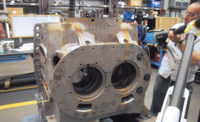Irrational, yes. But I was only nine years old. And in the days following its launch, there was talk of how Sputnik--the first manmade, earth satellite--proved that the communist Soviet regime had jumped ahead of America in the race for space. It was a startling and ominous development, one that some feared could mark the beginning of the end for democracy, and for the American way of life. Scary stuff!
To me, these Arial feel a bit like those days. To be sure, the tragic human toll of the Sept. 11 terrorist attacks on America brought a great sadness to the land that didn't exist in 1957. But both events aroused feelings of fear and great uncertainty about the future. And both had a galvanizing effect on Americans that brought the nation together as few things can.
Just as the United States rose to the challenge to win the space race and, ultimately, the Cold War, I am certain that our nation will do what it must to meet and defeat the terrorist challenge as well. It won't be easy. As the Bush administration has repeatedly stressed, this will be a war fought on many fronts.
One early order of business lies in getting the U.S. economy back on track. Federal economic stimulus efforts and interest rate cuts can help. But much will depend on the actions of U.S. consumers and businesses.
On the business side, manufacturing quality professionals can make important contributions. In many sectors, the cost of doing business in the post-terrorist attack economy will be higher, because of increased costs for security and insurance, among other factors. In this environment, productivity gains of the kind that fueled economic growth in the 1990s will be difficult to sustain. That's why continuous quality improvement will become all the more important; improving quality, after all, is one way to increase productivity.
Besides redoubling quality improvement efforts, quality professionals may also be called upon to develop new methodologies to adjust to changed business conditions. In the aftermath of the Sept. 11 attacks, for example, the automotive industry's just-in-time manufacturing systems were disrupted as trucks carrying parts needed to keep plants running were held up over security concerns at the Canadian border. These delays are likely to be minimized as more time passes. But some industry experts believe that JIT systems--important for quality as well as cost control--may have to be rethought and redesigned.
Perhaps most important for the economy is that businesses resist the urge to pull back in the face of uncertainty. That may mean sticking it out without layoffs. And it may mean moving ahead with plans to buy new factory equipment to boost quality and productivity, despite the uncertainty ahead.
"We can't let the terrorists stop us," as one manufacturing executive told me recently. "We have to continue to operate as we did before this happened, both consumers and business, and if we all do that, then we'll all be just fine."
My sentiments, exactly.
